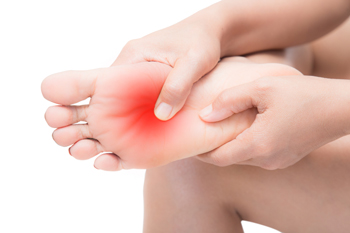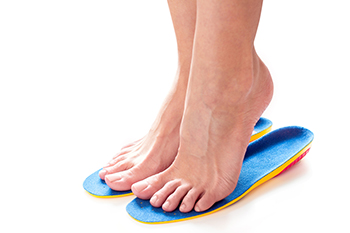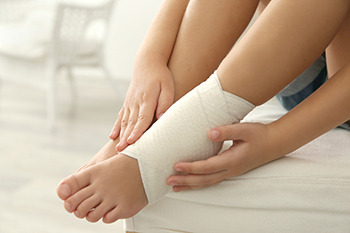

Diabetic peripheral neuropathy is a common complication of type 1 and 2 diabetes. It occurs when high blood sugar levels damage the nerves extending from the brain and spinal cord to various body parts, including the feet. This condition primarily affects the peripheral nerves, which control sensations and movements in the arms, legs, hands, and feet. Characteristics of diabetic peripheral neuropathy are numbing and tingling sensations, loss of feeling in affected areas, and burning or shooting pain. Additional symptoms include muscle weakness, coordination problems, or foot and leg complications. Treatment options may consist of medications to manage pain, exercise to improve strength and coordination, and lifestyle modifications to prevent complications. Studies suggest that low-level laser therapy for peripheral neuropathy may improve pain and other symptoms, such as sensory function. Laser therapy has also been shown to increase foot temperature, suggesting improved microcirculation. If you suffer from diabetic neuropathy, make an appointment with a podiatrist to discuss which treatment is best for you.
Neuropathy
Neuropathy can be a potentially serious condition, especially if it is left undiagnosed. If you have any concerns that you may be experiencing nerve loss in your feet, consult with the podiatrists from The Foot & Ankle Center of New Jersey. Our doctors will assess your condition and provide you with quality foot and ankle treatment for neuropathy.
What Is Neuropathy?
Neuropathy is a condition that leads to damage to the nerves in the body. Peripheral neuropathy, or neuropathy that affects your peripheral nervous system, usually occurs in the feet. Neuropathy can be triggered by a number of different causes. Such causes include diabetes, infections, cancers, disorders, and toxic substances.
Symptoms of Neuropathy Include:
Those with diabetes are at serious risk due to being unable to feel an ulcer on their feet. Diabetics usually also suffer from poor blood circulation. This can lead to the wound not healing, infections occurring, and the limb may have to be amputated.
Treatment
To treat neuropathy in the foot, podiatrists will first diagnose the cause of the neuropathy. Figuring out the underlying cause of the neuropathy will allow the podiatrist to prescribe the best treatment, whether it be caused by diabetes, toxic substance exposure, infection, etc. If the nerve has not died, then it’s possible that sensation may be able to return to the foot.
Pain medication may be issued for pain. Electrical nerve stimulation can be used to stimulate nerves. If the neuropathy is caused from pressure on the nerves, then surgery may be necessary.
If you have any questions, please feel free to contact our office located in Paramus, NJ . We offer the newest diagnostic and treatment technologies for all your foot care needs.

In the hustle and bustle of daily life, we often neglect our feet despite their vital role in keeping us mobile. Foot spas offer a soothing retreat for your hard-working feet, and the benefits extend far beyond relaxation. First and foremost, foot spas provide immediate relief from stress and fatigue. The warm water and massaging action soothe tired muscles, easing tension throughout your body. Additionally, foot spas can promote better circulation. The blood is stimulated to the feet and lower limbs, aiding in the removal of toxins and reducing swelling. This can be particularly beneficial for those individuals with circulation issues. Foot spas can also alleviate foot pain and discomfort. Whether it is due to a long day of standing or a specific foot condition, the combination of heat and massage can provide relief from common foot ailments such as plantar fasciitis or arthritis. Lastly, regular foot spa sessions can enhance overall foot health by softening calluses and promoting better nail care. These indulgent treatments offer a multitude of benefits that go well beyond a momentary pampering session. If you would like more information about the benefits of foot spas, it is suggested that you speak with a podiatrist.
Foot therapy is often necessary for those recovering from either foot deformities or foot injuries. If you have concerns regarding therapy, consult with the podiatrists from The Foot & Ankle Center of New Jersey. Our doctors can provide the care you need to keep you pain-free and on your feet.
Most Common Injuries
People who are active or athletes are prone to a variety of injuries. Therefore, it is often important to take part in physical therapy in order to quickly get back on the right track.
What to Do When Injured
Physical Therapy – This specialized treatment will focus on the affected area, speeding up recovery and the overall healing process. It is a proven method that has helped millions of people return from any injury.
During physical therapy you will undergo regimented training to get back into full form. Training is often very difficult, especially at first when the foot feels weak. Physical therapy often involves:
Basic stretching and twisting exercises – getting the feet’s mobility and flexibility up.
Massaging – the therapist will massage the injured area in order to activate the muscles and relax them.
Strengthening Exercises – this allows the muscles in the affected area to regain their full strength, a vital step towards full recovery.
If you have any questions please feel free to contact our office located in Paramus, NJ . We offer the newest diagnostic tools and technology to treat your foot and ankle needs.

Custom orthotics provide numerous advantages for athletes, which can profoundly impact their performance and physical well-being. These specialized insoles are tailored to the individual's unique foot structure and biomechanics, offering a precise fit that cannot be achieved with off-the-shelf alternatives. One of the primary benefits of custom orthotics is foot and ankle pain reduction. They distribute weight evenly, align bones and muscles, and alleviate stress on sensitive or injured areas. Moreover, custom orthotics promote enhanced athletic performance by ensuring proper foot alignment, preventing muscle overcompensation, and absorbing shock during physical activities. This not only aids endurance but also supports the knees, hips, and back. Furthermore, these personalized inserts significantly lower the risk of sports-related injuries by addressing specific biomechanical issues and providing tailored support. If you are an athlete seeking to improve your comfort and performance, it is suggested that you make an appointment with a podiatrist to discuss whether custom orthotics can help you.
If you are having discomfort in your feet and would like to try orthotics, contact the podiatrists from The Foot & Ankle Center of New Jersey. Our doctors can provide the care you need to keep you pain-free and on your feet.
What Are Orthotics?
Orthotics are inserts you can place into your shoes to help with a variety of foot problems such as flat feet or foot pain. Orthotics provide relief and comfort for minor foot and heel pain but can’t correct serious biomechanical problems in your feet.
Over-the-Counter Inserts
Orthotics come in a wide variety of over-the-counter inserts that are used to treat foot pain, heel pain, and minor problems. For example, arch supports can be inserted into your shoes to help correct overarched or flat feet, while gel insoles are often used because they provide comfort and relief from foot and heel pain by alleviating pressure.
Prescription Orthotics
If over-the-counter inserts don’t work for you or if you have a more severe foot concern, it is possible to have your podiatrist prescribe custom orthotics. These high-quality inserts are designed to treat problems such as abnormal motion, plantar fasciitis, and severe forms of heel pain. They can even be used to help patients suffering from diabetes by treating foot ulcers and painful calluses and are usually molded to your feet individually, which allows them to provide full support and comfort.
If you are experiencing minor to severe foot or heel pain, it’s recommended to speak with your podiatrist about the possibilities of using orthotics. A podiatrist can determine which type of orthotic is right for you and allow you to take the first steps towards being pain-free.
If you have any questions please contact our office located in Paramus, NJ . We offer the newest diagnostic and treatment technologies for all your foot and ankle needs.

Recurrent ankle sprains are a common issue, often resulting in chronic symptoms like pain, swelling, and instability. Reasons for this chronic problem include ligament laxity, proprioception deficits, and muscle weakness. There is a higher risk of this among younger individuals and athletes. A thorough evaluation, involving MRIs, diagnosis, and assessment of the severity of ankle injuries should be done to distinguish between functional and mechanical instability. Treatment options range from conservative methods like rest and elevation of the ankle, neuromuscular training, and bracing, to surgical interventions. If you find that you are spraining your ankle repeatedly, it is strongly suggested that you make an appointment with a podiatrist to evaluate your ankle and determine the best way to manage this for the best possible outcome.
Ankle sprains are common but need immediate attention. If you need your feet checked, contact the podiatrists from The Foot & Ankle Center of New Jersey. Our doctors can provide the care you need to keep you pain-free and on your feet.
How Does an Ankle Sprain Occur?
Ankle sprains take place when the ligaments in your ankle are torn or stretched beyond their limits. There are multiple ways that the ankle can become injured, including twisting or rolling over onto your ankle, putting undue stress on it, or causing trauma to the ankle itself.
What Are the Symptoms?
Preventing a Sprain
Treatment of a Sprain
Treatment of a sprain depends on the severity. Many times, people are told to rest and remain off their feet completely, while others are given an air cast. If the sprain is very severe, surgery may be required.
If you have suffered an ankle sprain previously, you may want to consider additional support such as a brace and regular exercises to strengthen the ankle.
If you have any questions please feel free to contact our office located in Paramus, NJ . We offer the newest diagnostic and treatment technologies for all your foot and ankle needs.